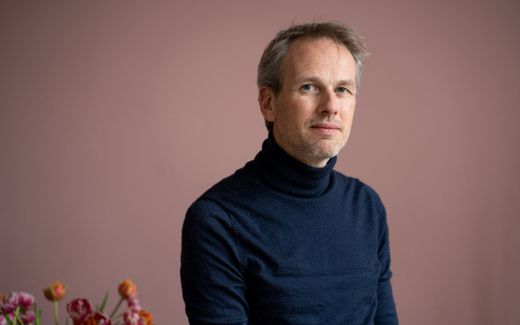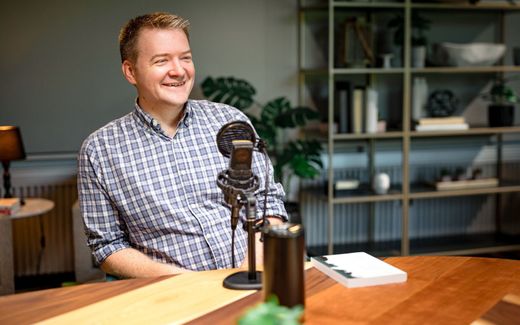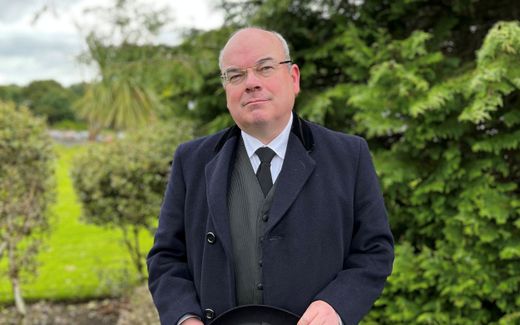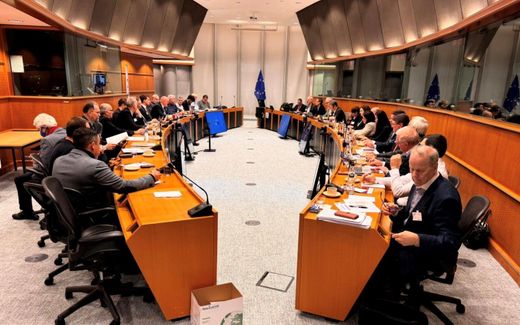Saying goodbye to faith on social media has become trend: "Return may take years"
11-10-2024
Christian Life
Ruben Bolier, RD

People walking out of church being influenced by social media. Photo ChatGPT
Christian Life
A trend in the Christian world: ex-Christians telling why they said goodbye to their faith via Instagram or YouTube. American Christian YouTubers Alisa Childers and Tim Barnett delved into the "explosion" of drop-outs.
Stay up to date with Christian news in Europe? Sign up for CNE's newsletter.
"Every few months, another popular Christian music artist or influencer on social media was coming out saying, I'm leaving the faith.", observes Barnett. ‘"Musicians, preachers and others become atheist, agnostic or progressive Christians. They say they are deconstructing or dismantling their faith. What is this phenomenon, I wondered. I planned to write a book about it and asked Alisa Childers if she would collaborate on it."
Barnett had good reason to ask Childers. The mother of four was going through a "faith crisis" about 15 years ago. "We had moved to Tennessee. The pastor of our new church questioned core issues of the Christian faith and explained them away. As a result, I entered a dark, agonizing period of doubt. But the Lord rebuilt my faith through apologetics. After this time, I started my blog and YouTube channel to help others with doubts of faith."

Doubters
Barnett also faced critical questions about the Christian faith. He grew up in an isolated Christian community. However, when he started studying in a secular environment, he encountered critical questions about God and the Bible. The answers to these he had to find for himself.
These experiences later helped him to show doubters the way. Since 2015, he has been a full-time apologist at Stand to Reason, an organisation that trains Christians to defend their faith. He also runs the YouTube channel Red Pen Logic.
Deconstruction
The two apologists regularly scour the internet for their work, where they often come across the term ‘deconstruction’. Childers: "Everyone means something different by it. Many use the word for "saying goodbye to the faith". Well-meaning evangelical leaders sometimes say that there is also "healthy" deconstruction, where you end up with Biblical faith. I used to say the same thing until recently. But that is confusing, and kind of misleading, I now find. Indeed, the word deconstruction is used by ex-Christians to denote departure from core Biblical truths."
According to Barnett, a "postmodern thought process" like deconstruction does not use the Bible as its basis. This is another reason why many ex-Christians will not see a return to orthodox Biblical Christianity as a true deconstruction. Childers: "If you say, I deconstructed, but I believe that Jesus died for my sins and that marriage is between one man and one woman, they reply: You still believe in a toxic theology, so you did not deconstruct."
Book
No scientific work had yet been written on the phenomenon. So the two "were kind of on our own". They dove into social media and books to find out what "deconstructionists" had to say.
By describing their views and discussing them in a book, family members and friends can understand them better, Barnett and Childers find.
There are several reasons for deconstruction. Childers: "For some, Christianity was something you do on Sundays, without personal faith, especially in the American Biblebelt. Now that the Christian faith is no longer so obvious, and doubts or other trials may come your way, this can make you say goodbye to faith. Even if you previously believed that the Christian faith was true."
Social media also play a "major role" in the rise of the phenomenon, according to the apologists. A person who says goodbye to Christianity can join an online community where it is said that he or she has made a good choice. Before the age of the internet, these people were more on their own, but now they have a digital megaphone with which to shout their ideas into the world, Childers observes.
Critique
The book, published in January, received much positive response from the Christian world. But not from the deconstructionist movement. One criticism was that Barnett and Childers did not research this movement thoroughly enough and misrepresented its views. Barnett: "But we followed many of their influencers, as well as their followers. We spoke to several of them through Zoom. And thanks to all the books and accounts of those deconstructed, we were able to get a good understanding of their views."
Despite the "explosion" of deconstructions, the apologists have hope. Both know examples of return. For instance, Jesse Westwood had gone from being a Christian to being an atheist, but later returned to Christianity. Another is Dave Stovall, who deconstructed to a progressive Christianity. He too returned to orthodoxy, with the help of a local pastor.
"It can take years for people to return to faith", says Barnett. "But be there for them. They may ask questions. So did John the Baptist in prison, and Jesus answered him. However, it is still a matter of the heart, and we must pray for God to change their hearts."
“I thought the Christian religion made people anxious and gloomy”
Joost van de Steeg (27) from the Dutch town of Nunspeet attended a conservative Reformed church. In his teens, he said goodbye to the Christian faith, but in 2021, he changed radically.
"When I was a small child, I believed in a childlike way that God existed and that the Bible was true. Around the age of eight, I became convinced that I needed to be converted and prayed for that. A few years later, however, I no longer believed that the Bible was true and stopped praying. I don't remember the immediate reason for that.

I mostly kept my thoughts to myself. Critical questions I never voiced, because I didn't really concern myself with them anymore at that time. I had a certain indifference. I was not hostile, but for me, eternity no longer existed.
Around the age of 16, I started thinking that religion is just a human concept. I thought: we all look for a way to deal with the suffering in the world and find the answer in some religion. Later, I increasingly got the idea that the Christian religion makes people fearful and gloomy, with all its teachings about hell, sin and grace. By instilling fear in people, it sustains itself, I suspected.
Convincing evidence
Incidentally, I did wish I could believe because I also saw that faith provided a foothold. But it bothered me that people appealed to the Bible. I thought: how can you claim that such a book contains absolute truth? I could only believe if there was convincing evidence. And I didn't have that.
I once saw a clip of the Dutch comedian Hans Teeuwen. He picked up a note on which he wrote: "The Bible is not true" or something similar. Then he said: "If someone says to me that the Bible is true, I reply: It is not, because" –pointing to the note– "it is written: "The Bible is not true."" That illustrates how I was thinking. The different opinions I encountered online certainly also influenced my way of thinking.
Never did I find it intrusive when family members or church elders addressed me. Some years ago, for instance, I had some conversations with young people in my close circle who had come to faith. After one of them experienced something of Christ's love, he said, "It feels like you are in love with someone." I replied, "How nice that you believe and experience that, but other things make me happy."
Even if the best arguments for the Christian faith had been put forward, they would not have convinced me. As our preacher said to me, "I can't convince you, but God can."
God was not necessary to make life meaningful, I thought – we should be good to each other and respect each other's religion, but don't bother me with it. I got meaning from life before death. Such vacuous views in hindsight.
Divine election
By then, I was living in Zwolle, and in early June 2021, I wanted to go to my parents' house for a weekend. Then, it occurred to me that we would go to church on Sunday, and I didn't feel like it. My mind made a leap from Sunday church attendance to certain tenets of the faith, such as divine election.
Curious as I was, I googled the word. I saw Romans 8 in the results and started reading. That chapter says: "Therefore the thought of the flesh is enmity against God; for it does not submit to the law of God." And at that moment, that became a reality for me. It affected me deeply: I was an enemy. Then I knew that God exists and that He has always seen me, like waking up and having a blindfold removed from your eyes. I wanted to hide and cried out to God: If You exist, how can I ever exist for You? An exclamation of surprise and terror.
A few months after that, I experienced something of God's love for the first time. At that time, I understood something of the "bonds of death" and "terrors of hell" described in Psalm 116. At that time, I read about the Armour in Ephesus and Psalm 91, which says that God is the Refuge, and His truth is a shield and buckler. Then I saw that Jesus Himself is the Armour. Again, it's like having a blindfold removed from your eyes. They sometimes say, "Love melts the heart", and that is true.
Other people reacted with surprise, often saying, "Nice for you, such a change. But I don't understand why you go to such a conservative church again." But in those "strict" churches, I heard what lived in my heart and Who God is.
The Bible has power and confirms itself. Non-believers don't get that, and neither do I sometimes. Grace is the only reason it becomes truth. I read the same thing recently from Robert Walker. He was one of the best students at Cambridge University in the nineteenth century and, at first, could not be convinced that God's Word was true. But later, he learned to believe like a child. So God's grace can reach everyone because Jesus came to seek and save lost people."
This article was translated by CNE.news and published by the Dutch daily Reformatorisch Dagblad on September 26, 2024
Related Articles









